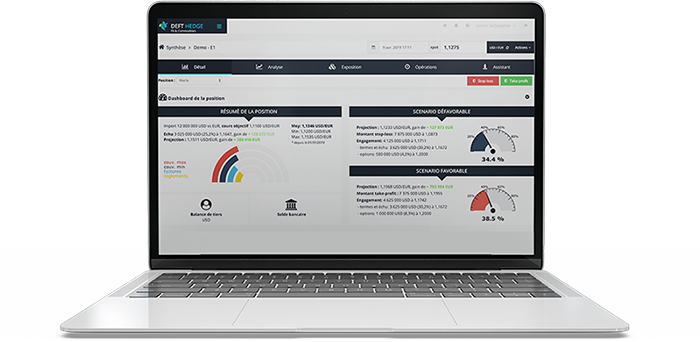Foreign exchange gain and accounting.

Among the accounting issues for your foreign currency transactions are foreign exchange gains. These profits are linked to currency exchange rate fluctuations that will be in your favour when you make transactions abroad. In order to maximise these foreign exchange gains, DeftHedge offers you its SaaS solution specially designed for companies.
In order to improve all your international transactions, the DeftHedge software supports you and helps you in your daily decision making.
What is a foreign exchange gain ?
Since the exchange rate is not fixed, buying and selling transactions in foreign currencies can be more or less beneficial to your business depending on the economic situation. In your international operations, it is therefore essential to take account of this variation in the value of currencies in order to carry out your transactions under the most favourable conditions.
A foreign exchange gain occurs when the change in value of one currency relative to another becomes favourable to the selling company.
This gain on sale is therefore effective when the transaction is settled at a higher rate than at the time of accounting entry by the selling company.
Foreign exchange gains are then passed on to the company’s income statement.
How to calculate the exchange rate gain ?
At the end of each financial year of a company, all gains and exchange losses are calculated. The overall amount is calculated by recalculating the monetary item at the exchange rate in force at the end of the accounting year.
Depending on the result, the company may therefore obtain an exchange gain or loss. Once the calculation has been made, the company must proceed to record these exchange gains and losses.
Since 1 January 2017, the details of these foreign currency transactions have been recorded in several accounts:
The recording of foreign exchange gains and losses is therefore particularly detailed in a company’s financial year.


What is a passive translation difference ?
At the end of the financial year, the conversion may therefore result in the recognition of an asset or liability translation difference:
The translation difference will therefore be more or less significant depending on the fluctuation in exchange rates during the period.
In order for your translation difference to be a liability, you should therefore adopt the best possible financial strategy.
How to record your operations impacted by currency fluctuations ?
To make it easier to record your foreign exchange transactions, you have the option of having a foreign exchange account.
Article 420-7 of the General Chart of Accounts does not impose any particular rule concerning the keeping of this type of account, only the obligation to convert the sums recorded at the end of the accounting year.
This external account thus allows you to keep your various transactions as separate as possible and to simplify your accounting.
Find out more about : accounting and exchange rates
- Conversion at the end of the financial year: through the liaison accounts which allow the link between currencies.
The recording of foreign currency transactions in a specially dedicated account therefore appears to be particularly suitable to facilitate your accounting at the end of your financial year.
Improve your foreign exchange gain with DeftHedge
Thanks to our solution for companies, you will therefore save time, allowing you to focus on your financial strategy for your international transactions.
DeftHedge advises and supports you in the orientation of your strategy in the face of exchange rate risks. Perfectly informed about your accounting and financial situation, you will be able to take the most appropriate decisions to carry out all your foreign exchange transactions and optimise your foreign exchange gains.
Thanks to DeftHedge, you will also be able to carry out several strategy simulations and identify the most suitable one to increase your foreign exchange gains. In order to simplify your foreign exchange transaction management and thus be more serene on a daily basis, don’t hesitate to opt for DeftHedge’s SaaS solution and its various functionalities.
